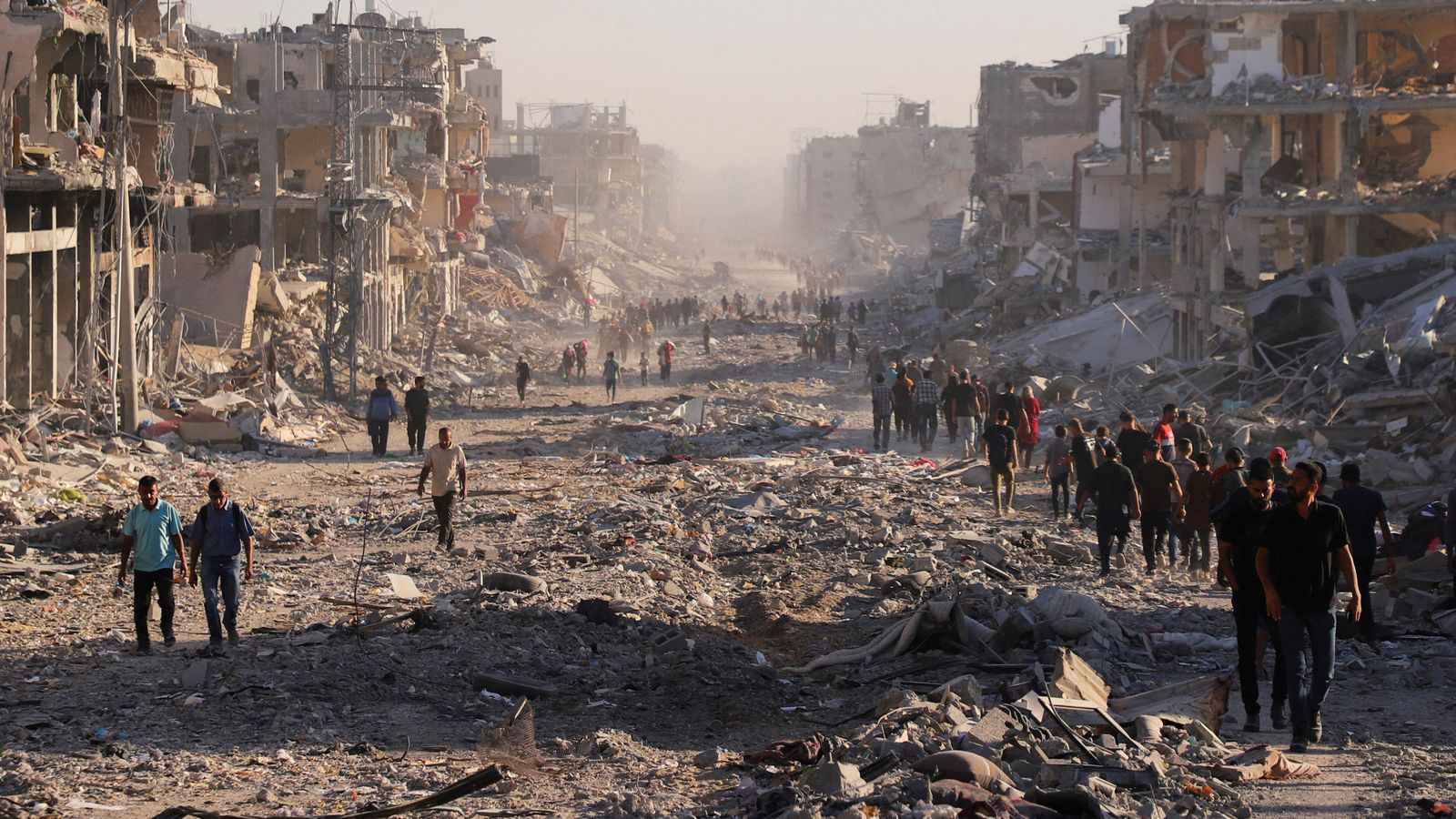
When the bus came into view, there was a surge of expectation and a rush of people.
Everyone wanted to get a view, to see through the windows, to see if they could spot a familiar face, or a relative, or a friend.
Gaza deal signed – as it happened
These were the people being sent back to the West Bank as part of the ceasefire deal – the people exchanged for the hostages.
The welcome they got was chaotic and joyful, just like previous prisoner releases. But there was something different this time – a changed, charged atmosphere and a heavier police presence.
And as the minutes passed by, the sense of joy was also pockmarked by pockets of utter sadness.
At first, it was a mistake. We saw a woman in floods of tears watching as prisoners filed off the two buses, showing victory signs at the waiting crowds. She had come to meet a cousin, but was sure that somehow he had been missed out and left behind. Her tears flowed until, some time later, she found him.
But others were not so fortunate. Overnight, the Israeli authorities had decided to increase the number of prisoners deemed dangerous enough to be denied a return to the West Bank.
Instead, this group, which makes up the majority of the 250 released prisoners, was taken to Gaza and released. Then they get the choice of whether to stay in Gaza or to be deported to another country – possibly Egypt or Turkey.
It is one thing to be taken back to Gaza if you are Gazan. But for the prisoners who come from the West Bank, and who are confronted by the apocalyptic wasteland left behind by war, it is a ticket to deportation, and the knowledge they can never return to their homeland.
You can only get to the West Bank by going through Israeli checkpoints or passport checks. And, clearly, having been deported, you won’t be allowed back in.
And so it is that we see Ghadeer in floods of tears. She is a police officer, in her uniform, and she runs back to the sanctuary of her car, to cry.
‘Psychological terror’
Her sister Abeer is also here, and also distraught. Their brother, who they expected to collect, has been taken to Gaza. They did not know until they got here, and realised he had not emerged from the bus.
Her cousin, Yahya, is also here: “We got a call from my cousin last night, and then we got a written warning taped on our door saying that we weren’t allowed to celebrate.
“At midnight, they moved him south, and then to Gaza, all without our knowledge. We came here to see him, and we were shocked that he wasn’t on the bus.
“It is part of their playbook – psychological terror, playing with our emotions, and those of the prisoners.”
To Israel, the release of these prisoners has been a cause of soul-searching, criticised by some as a reckless action that frees terrorists. But for Palestinians, these prisoners are a blend of freedom fighters and political prisoners, some of whom have spent years in detention despite never facing criminal trial.
The prisoners have been told not to celebrate after their release, and these are warnings they take seriously. One man tells us: “I can’t talk, but I am happy.” Another simply says” “I can’t say anything today – come back tomorrow.”
Read more:
UK played ‘vital role’ in Gaza deal
Drones capture images of Gaza devastation
‘They are taking our soul’
But another tells us he is “ashamed” that it could have taken the death of so many people in Gaza to secure his release. Emotions run high.
Among the crowds, we see Aman Nafa. Her husband is Nael Barghouti, who has spent 45 years in prison – more than any other Palestinian prisoner – and is now in exile in Turkey. He’s banned from returning, she’s banned from visiting him.
I ask her about the ceasefire, and the chances of a new beginning between Israel and the Palestinians. She bristles.
“They don’t want any peace with us,” she says. “They just want to take the land. It’s like our soul – they are taking our soul. They are torturing us.”
I ask her about her emotions on a day when the focus of the world is on the return of the hostages.
“Double standards,” she says, “but the people around the world – they know what is happening in Palestine. We are not against Jewish people. We are against the Zionists who want to empty our land and take it.”
Acrimony, mistrust, and the fear of tomorrow are endemic among many in the West Bank. A ceasefire in Gaza has soothed some nerves, but, so far at least, it hasn’t addressed the fundamental problems.
And so the anxiety ripples onwards.
Doonited Affiliated: Syndicate News Hunt
This report has been published as part of an auto-generated syndicated wire feed. Except for the headline, the content has not been modified or edited by Doonited



















































